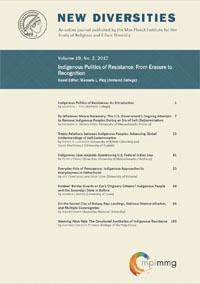Hobbes’ Border Guards or Evo’s Originary Citizens? Indigenous People and the Sovereign State in Bolivia
by Andrew Canessa (University of Essex)
To cite this article: Canessa, A. (2017). Hobbes’ Border Guards or Evo’s Originary Citizens? Indigenous People and the Sovereign State in Bolivia. New Diversities, 19(2), 69–84. https://doi.org/10.58002/6bsx-gc60
Thomas Hobbes was the first major thinker to locate an imagined pre-political State of Nature in the Americas. Even his critics such as Locke and Rousseau followed him in seeing native Americans as living in a world which they imagined existed in pre-historic Europe and, most importantly, beyond meaningful dialogue. These and other thinkers used America as a tool through which to think the status of the individual political subject and his relationship with the state. This article argues that indigenous people were much more than rhetorical tools but, rather, were necessary elements for imagining the modern nation state; they were in Shaw’s words, Hobbes’ ‘border guards’ (2008: 38). Indigeneity, however, does more than act symbolically as a ‘border guard’ facing the ‘other’ across the parapet of the boundaries of the sovereign state; indigenous people were and are actively challenging those boundaries, shaping its contours, and occasionally breaching the wall altogether.
In this article, I look at Bolivia as an example of how indigenous peoples have through history contributed to, challenged, and moulded the various states – from colonial to contemporary indigenous — over the past half millennium. I also explore the contemporary indigenous state and the ways in which the indigenous subject is imagined as the canonical citizen but ask if this move forecloses the possibilities of a radical critique of the sovereign state.
Keywords: Hobbes, Evo Morales, indigenous people, state
|
